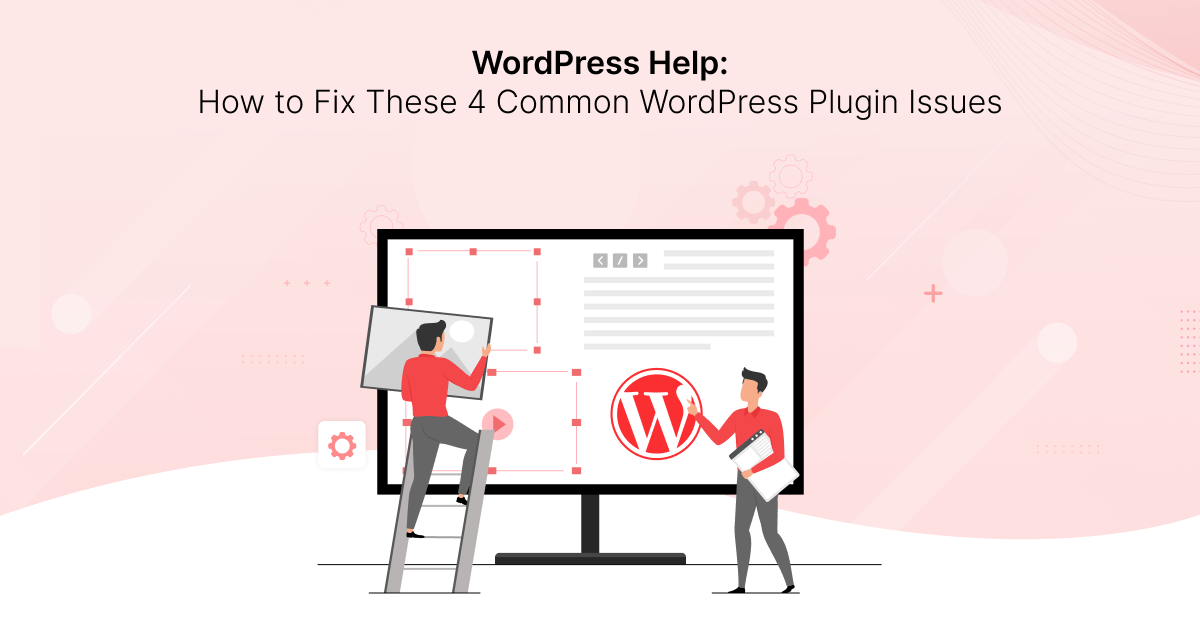
As a WordPress user, you’re already aware of the benefits plugins can have for your WordPress website. These dynamic add-ons have the power to enhance your website’s functionality, improve its appearance, and boost its overall performance.
Whether it’s adding eCommerce capabilities, supporting your SEO strategy, or enhancing the user experience, plugins can be highly strategic tools for your WordPress site.
But, as with most technology, the more advanced your tools are, the higher the risk of complications.
As you navigate the world of WordPress plugins and add more features to maintain a competitive edge, things can get complicated fast!
To help, our team is here with 4 common WordPress plugin issues to look out for, and how to resolve them.
Let’s dive in.
1. Plugin Conflicts: Getting Ahead of Integrations
Have you ever encountered the white screen of death at a very inconvenient time? Or maybe you’ve come up against the dreaded Destination Folder Already Exists message? These frustrating issues are often triggered by plugin conflicts, usually as a result of venturing away from WordPress’s default theme and other standardized features.
When 2 or more plugins clash, or when third-party themes don’t support your plugins, it can lead to: error messages, site downtime, poor website performance, and even users being locked out of their accounts.
So, how can you avoid this?
Because these issues usually mean some of your plugins are outdated or incompatible, here’s how you can identify and resolve these issues ahead of time:
- Audit your plugins: Regularly visit your plugins page and review your installed plugins, removing any items in your plugins folder that you no longer need. An outdated or unnecessary plugin file can be a common source of conflicts.
- Keep your plugins updated: Ensure your plugins are always up-to-date. Developers frequently release updates to maintain security and compatibility with themes and other plugins.
- Always test new plugins: Before installing a new plugin on your live site, it’s wise to check for conflicts in a staging environment first. If you encounter issues while testing a new plugin, deactivating plugins one at a time can be a good idea to isolate potential conflicts.
- Consult WordPress specialists: If you encounter complex problems or find yourself facing the white screen of death, consider seeking assistance from dedicated WordPress specialists. They’ll be able to quickly identify the issue, resolve conflicts, and restore your site before your business is negatively impacted.
Tip: Be sure to maintain an organized WordPress dashboard and plugin folder structure. A well-organized system ensures easy access to your plugins and helps you promptly identify and address any potential issues.
2. Security Glitches: Guarding Against Compliance Issues
Security glitches can have serious consequences for your digital agency or business. From data breaches to site downtime, the wrong approach to plugin security can lead to reputational damage and even legal action for you or your clients.
Unfortunately, while many plugin developers are skilled at what they do, security-related vulnerabilities can still exist. This is why it’s essential to ensure security glitches don’t end up putting your entire business at risk.
To safeguard your WordPress site and maintain compliance, consider these essential steps:
- Always choose trustworthy plugins: As tempting as it can be to download new plugins offering innovative features, it’s important only to download plugins from reputable sources. While it is possible to trust sources other than the official WordPress repository, research before trusting unverified plugin providers that could put your website security at risk.
- Consistently carry out security audits: An outdated or unsupported plugin can become a prime target for cyberattacks. This is why it’s vital to regularly conduct security audits of your plugins and remove any plugins that lack current updates or support.
- Implement strong passwords: Even the strongest security measures can be compromised by user negligence. To strengthen your site’s defenses, enforce strong passwords across your team and enable two-factor authentication to deter hackers.
- Develop an incident response plan: Not all security glitches can be avoided, even with the best prevention practices in place. Having a well-thought-out incident response plan can minimize damage in the event of an incident and help you maintain compliance. Define the steps to follow if a security breach occurs, and make sure staff are trained to identify the breach, contain it, and notify affected parties immediately.
Tip: Stay connected with the WordPress community by joining relevant online forums and communities. These platforms can be really valuable for sharing experiences and insights, including potential security risks that may be affecting other businesses.
3. Website Performance Issues: Avoiding Website Woes
There’s no doubt that maintaining optimal website performance is crucial in today’s fast-paced digital society. Website users demand efficiency, and a slow website can mean missed opportunities for you, and your clients.
Plus, as web accessibility becomes an increasingly important factor for modern-day web users, it’s vital that your plugins don’t create barriers for your audience. Your WordPress website should feel welcoming to all.
To ensure your site remains fast and accessible:
- Find out how mobile-friendly your plugins are: With the increasing use of mobile devices, it’s now essential to make sure that your plugins are mobile-responsive and work well on smartphones and tablets. Not only will mobile optimization ensure a better user experience, but it can also positively impact your site’s search engine ranking.
- Optimize images and scripts: Large images and excessive scripts tied to plugins can significantly slow down your website. This is why it’s crucial to optimize plugin-related images and minimize unnecessary scripts to reduce loading times. It’s also wise to consider using caching plugins from reputable providers to enhance overall plugin performance.
- Monitor and analyze speed impact: Regularly monitor and analyze your website’s loading speed, paying specific attention to how plugins affect performance. Tools like Google PageSpeed Insights can help identify plugin-related bottlenecks, allowing you to be more proactive in your approach to plugins. You shouldn’t have to use a default WordPress theme or plugin for things to run smoothly — you just need to be strategic!
- Ensure plugins align with accessibility measures: Make sure your plugins comply with web accessibility standards to provide an inclusive experience for people with additional needs. For example, it’s now standard practice to incorporate alt text for plugin-related images, and to offer additional keyboard navigation. If you’re unsure about WordPress-specific accessibility, WordPress consultants or specialists can complete an audit on your behalf.
Tip: Also, check for PHP version compatibility with all the plugins you’re using for optimal site performance. While WordPress aims to support new versions of PHP as soon as they’re released, some plugins may lag, leading to plugin errors.
4. Poorly-Coded Plugins: Spotting Signs of Code Errors
Dealing with poorly-coded plugins can be a real headache, especially for digital agencies juggling multiple clients and businesses in fast-paced industries. These problematic plugins not only have the potential to wreak havoc on your website’s functionality and performance, but they can also cause significant downtime or even lead to data leaks.
To avoid the chaos caused by a faulty plugin, it’s crucial to be able to recognize the signs of bad development and code errors early on.
Here are some key indicators to look out for:
- Frequent crashes: If you notice that your website is crashing regularly, it could be a sign of a poorly-coded plugin. These crashes are often due to compatibility issues or inefficient code that can overwhelm your site.
- Slow page loading: Poorly-coded plugins can significantly slow down your website’s loading times. When pages take too long to load, it can frustrate your users, and lead to higher bounce rates.
- Unexpected errors: Keep an eye out for broken links or that infamous ‘404 error’ message on your site. These could be caused by conflicts between plugins or coding issues within a particular plugin.
- Increased security risks: Poorly-coded plugins can create vulnerabilities in your website’s security. These weak spots could be exploited by hackers, leading to data breaches or other security threats.
- Compatibility problems: Check for compatibility issues with other plugins or your WordPress version. Poorly-coded plugins may not work well with other elements of your website, causing conflicts.
Partner with the Experts for a Stress-Free WordPress Experience
Even for well-seasoned WordPress users, fighting plugin glitches on your own can be a daunting task. This is why if you want to streamline your WordPress experience, partnering with a team of professional WordPress experts can be the ultimate solution.
At UnlimitedWP, we provide white-label WordPress development services, offering everything from assistance with common plugin issues to crafting complete WordPress management strategies for your digital agency or business.
By enhancing security, optimizing performance, and managing issues as they arise — we can ensure that you and your clients get the most from WordPress.
Reach out to UnlimitedWP today to book a FREE demo call. Let’s simplify your WordPress experience, one plugin at a time!
